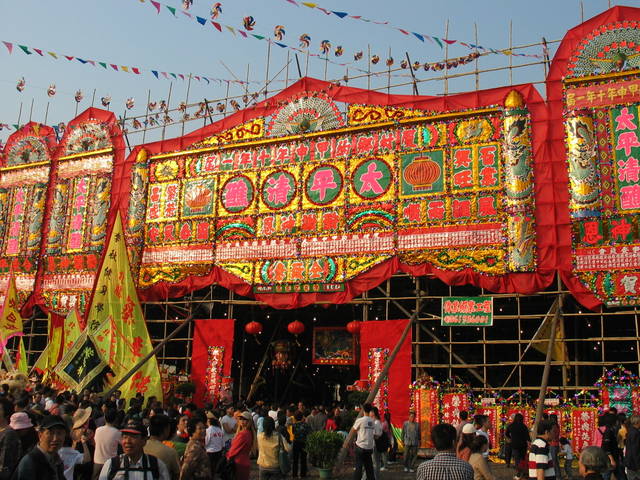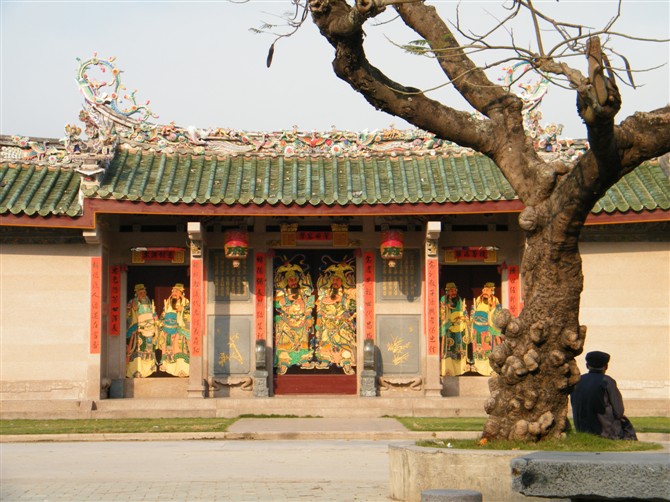|
Tsz Tin Tsuen
Tsz Tin Tsuen () is a village in Lam Tei, Tuen Mun District, Hong Kong. Administration Tsz Tin Tsuen is a recognized village under the New Territories Small House Policy. It is one of the 36 villages represented within the Tuen Mun Rural Committee. For electoral purposes, Tsz Tin Tsuen is part of the Yan Tin (constituency), Yan Tin constituency, which is currently represented by Apple Lai Ka-man. History According to one source, Tsz Tin Tsuen was first settled by the Liao (surname), Lius () during the Ming dynasty (1368-1644) and later by the Tang Clan, Tang (), the Chan (surname), Chan () and the Mai (Chinese surname), Mak ().Antiquities Advisory Board. Historic Building AppraisalNos. 245 and 247 Tsz Tin Tsuen/ref> Another source mentions that Tsz Tin Wai was founded during the late Ming dynasty by a branch of descendants of Tang Hung-wai of Ha Tsuen. Two brothers of the Tang Clan, Tang Siu-lung () and Tang Siu-wai () of the 16th generation, from Ha Tsuen, settled in the vi ... [...More Info...] [...Related Items...] OR: [Wikipedia] [Google] [Baidu] |
Gate Of Tsz Tin Tsuen In April 2022
A gate or gateway is a point of entry to or from a space enclosed by walls. The word derived from old Norse "gat" meaning road or path; But other terms include ''yett and port''. The concept originally referred to the gap or hole in the wall or fence, rather than a barrier which closed it. Gates may prevent or control the entry or exit of individuals, or they may be merely decorative. The moving part or parts of a gateway may be considered "doors", as they are fixed at one side whilst opening and closing like one. A gate may have a latch A latch or catch (called sneck in Northern England and Scotland) is a type of mechanical fastener that joins two (or more) objects or surfaces while allowing for their regular separation. A latch typically engages another piece of hardware on ... that can be raised and lowered to both open a gate or prevent it from swinging. Locks are also used on gates to increase the security. Larger gates can be used for a whole building, such as a c ... [...More Info...] [...Related Items...] OR: [Wikipedia] [Google] [Baidu] |
Chan (surname)
Chan is a non-pinyin romanisation of multiple Chinese surnames, based on different varieties of Chinese. Among respondents to the 2000 United States Census, Chan was the 12th-most common surname among Asian Pacific Americans, and 459th-most common overall, with 59,811 bearers (91.0% of whom identified as Asian/Pacific Islander). Chan was the ninth-most common Chinese surname in Singapore as of 1997 (ranked by English spelling, rather than by Chinese characters). Roughly 48,400 people, or 1.9% of the Chinese Singaporean population, bore the surname Chan. Cantonese romanisation of 陈/陳 Chan is a Cantonese romanisation of the surname spelled in pinyin as Chén (). *Diana Ming Chan (; 1929–2008), American social worker of Chinese descent *Amy Chan (badminton) (; born 1961), Hong Kong badminton player * Isabel Chan (; born 1979), Hong Kong actress *Gemma Chan (; born 1982), English actress and model of Chinese descent *Eugene Chan (), Hong Kong linguist Hokkien romanisation of ... [...More Info...] [...Related Items...] OR: [Wikipedia] [Google] [Baidu] |
Walled Villages Of Hong Kong
Most of the walled villages of Hong Kong are located in the New Territories. History During the Ming and Qing dynasties, the shore of Guangdong suffered from pirates, and the area of present-day Hong Kong was particularly vulnerable to pirates' attacks. Winding shores, hilly lands and islands and remoteness from administrative centres made the territory of Hong Kong an excellent hideout for pirates. Villages, both Punti and Hakka, built walls against them. Some villages even protected themselves with cannons. Over time, the walls of most walled villages have been partly or totally demolished. Names In Punti Cantonese, ''Wai'' (, Walled) and ''Tsuen'' (, Village) were once synonyms, hence most place names which include the word 'wai', were at some point in time a walled village. Conservation Two heritage trails of Hong Kong feature walled villages: * Ping Shan Heritage Trail. One walled village: Sheung Cheung Wai (). * Lung Yeuk Tau Heritage Trail. Five walled villages: ... [...More Info...] [...Related Items...] OR: [Wikipedia] [Google] [Baidu] |
Punti
''Punti'' ( zh, t=本地, j=bun2 dei6, l=locals) is a Cantonese endonym referring to the native Cantonese people of Guangdong and Guangxi. ''Punti'' designates Weitou dialect-speaking locals in contrast to other Yue Chinese speakers and others such as Taishanese people, Hoklo people, Hakka people, and ethnic minorities such as the Zhuang people of Guangxi and the boat-dwelling Tanka people, who are both descendants of the Baiyue – although the Tanka have largely assimilated into Han Chinese culture. In Hong Kong, ''Punti'' as a group refers in a strict sense to the Cantonese-speaking indigenous inhabitants of Hong Kong who settled in Hong Kong before the New Territories of Hong Kong were leased to the British Empire in 1898. Prominently represented by the "Weitou people" () – the Hau (), Tang (), Pang (), Liu (), and Man () – these indigenous ''Punti'' inhabitants were afforded additional privileges in land ownership enshrined in the Convention for the Extension of ... [...More Info...] [...Related Items...] OR: [Wikipedia] [Google] [Baidu] |
Tai Ping Ching Chiu
Dajiao, ()''New Journey Through History 1A''. Kan, Nelson Y. Y. and Tang, Miranda K. L. Published by Aristo Education Press LTD. called the Taiping Qingjiao or Taai ping ching jiu in Hong Kong, () is a Taoist ritual and festival which is performed every year. The ritual is to pray and request the Taoist Deities to bestow peace and harmony in the particular neighborhood or location. Pak Tai is the most popular Chinese Deity for this religious service and rituals. Believers have to abstain from meat and eat vegetarian food at the festival. It is performed across Greater China: Sichuan, Fujian, Taiwan, Guangdong and Hong Kong. Hong Kong The festival name is transliterated as Tai Ping Ching Chiu from Cantonese. Some of these festivals are called Da Jiu Festival, a famous one of which is the Cheung Chau Bun Festival Cheung Chau Bun Festival or Cheung Chau Da Jiu Festival is a traditional Chinese festival on the island of Cheung Chau in Hong Kong. Held annually, and with therefor ... [...More Info...] [...Related Items...] OR: [Wikipedia] [Google] [Baidu] |
Ha Tsuen Shi
Ha Tsuen Shi () is a village Ha Tsuen, Yuen Long District, Hong Kong. Administration Ha Tsuen Shi is a recognized village under the New Territories Small House Policy. For electoral purposes, Ha Tsuen Shi is part of the Ha Tsuen constituency. History At the time of the 1911 census, the population of Ha Tsuen Shi was 178. The number of males was 120. Features * (), also known as Yau Kung Tong (), was constructed by the Tang Clan of Ha Tsuen to commemorate their two founding ancestors, Tang Hung-chi and Tang Hung-wai, for establishing the village settlements in Ha Tsuen. Construction of the Ancestral Hall began in 1749 and was completed in 1750. It is a declared monument.Antiquities and Monuments OfficeTang Ancestral Hall, Ha Tsuen/ref> * (), a declared monument * Gate Tower of Ha Tsuen Shi. It was one of the gate towers built for the protection of the Ha Tsuen Shi market. Called the East Gate of the market, it is the only surviving old gate tower of the market. It is a Grad ... [...More Info...] [...Related Items...] OR: [Wikipedia] [Google] [Baidu] |
Modern Asian Studies
''Modern Asian Studies'' is a bimonthly peer-reviewed academic journal in the field of Asian studies, published by Cambridge University Press. The journal was established in 1967 by the Syndics of the University of Cambridge and the Committee of Directors at the Centre of South Asian Studies (CSAS), a joint initiative among SOAS University of London, University of Cambridge, University of Hull, University of Leeds, and University of Sheffield. The journal covers the history, sociology, economics, and culture of modern Asia. Since 2021, the journal has been co-edited by Johan Elverskog, (Southern Methodist University), Sumit Guha, A. Azfar Moin, and Robert M. Oppenheim (all at the University of Texas, Austin). The previous editor was Norbert Peabody (University of Cambridge). History In 1947, the Scarbrough Commission asserted that knowledge of Asian countries needed to be granted a permanent place in British academia. The commission, in its report, believed that knowledge of the ... [...More Info...] [...Related Items...] OR: [Wikipedia] [Google] [Baidu] |
Chinese Kin
A Chinese kin, lineage or sometimes rendered as clan, is a patrilineal and patrilocal group of related Chinese people with a common surname sharing a common ancestor and, in many cases, an ancestral home. Description Chinese kinship tend to be strong in southern China, reinforced by ties to an ancestral village, common property, and often a common spoken Chinese dialect unintelligible to people outside the village. Kinship structures tend to be weaker in northern China, with clan members that do not usually reside in the same village nor share property. ''Zupu''—the genealogy book A ''zupu'' () is a Chinese kin register or genealogy book, which contains stories of the kin's origins, male lineage and illustrious members. The register is usually updated regularly by the eldest person in the extended family, who hands on this responsibility to the next generation. The "updating" of one's ''zupu'' () is a very important task in Chinese tradition, and can be traced back thou ... [...More Info...] [...Related Items...] OR: [Wikipedia] [Google] [Baidu] |
Xin'an Gazetteer
''Xin'an Xianzhi'' (; literally ''Gazetteers of Xin'an County'') were the chorography of the historical Xin'an County (San-On or Sun-On County; literally ''New Peace County''; known at times as the Po-On County (spelt Bao'an in pinyin)) of Guangdong (then Kwangtung) in southern China. A few editions existed. The last editions were Qing's Kangxi Years (K'ang-hsi; 1661–1722) edition and Jiaqing Years (Chia-ch'ing; 1796–1820) edition. See also * Gazetteer A gazetteer is a geographical index or directory used in conjunction with a map or atlas.Aurousseau, 61. It typically contains information concerning the geographical makeup, social statistics and physical features of a country, region, or co ... Further reading * History of Guangdong History of Hong Kong History of Shenzhen Gazetteers {{Shenzhen-stub ... [...More Info...] [...Related Items...] OR: [Wikipedia] [Google] [Baidu] |
Wanli Emperor
The Wanli Emperor (; 4 September 1563 – 18 August 1620), personal name Zhu Yijun (), was the 14th Emperor of the Ming dynasty, reigned from 1572 to 1620. " Wanli", the era name of his reign, literally means "ten thousand calendars". He was the third son of the Longqing Emperor. His reign of 48 years (1572–1620) was the longest among all the Ming dynasty emperors and it witnessed several successes in his early and middle reign, followed by the decline of the dynasty as the emperor withdrew from his active role in government around 1600. Early reign (1572–1582) Zhu Yijun ascended the throne at the age of eight and adopted the regnal name "Wanli", thus he is historically known as the Wanli Emperor. For the first ten years of his reign, he was aided by a notable statesman, Zhang Juzheng, who governed the country as Wanli's regent. During this period, the Wanli Emperor deeply respected Zhang as a mentor and a valued minister. Archery competitions, equestrianism and calligra ... [...More Info...] [...Related Items...] OR: [Wikipedia] [Google] [Baidu] |
Royal Asiatic Society Of Great Britain And Ireland
The Royal Asiatic Society of Great Britain and Ireland, commonly known as the Royal Asiatic Society (RAS), was established, according to its royal charter of 11 August 1824, to further "the investigation of subjects connected with and for the encouragement of science, literature and the arts in relation to Asia." From its incorporation the society has been a forum, through lectures, its journal, and other publications, for scholarship relating to Asian culture and society of the highest level. It is the United Kingdom's senior learned society in the field of Asian studies. Fellows of the society are elected regularly. Fellows include highly accomplished and notable scholars of Asian studies. They are entitled to use the post-nominal letters ''FRAS''.The Oxford Dictionary of Abbreviations, 2nd edition, Market House Books Ltd and Oxford University Press, 1998, ed. Judy Pearsall, Sara Tulloch et al., p. 175Debrett's Peerage and Baronetage 2011, Debrett's Peerage Ltd, p. 26The Inte ... [...More Info...] [...Related Items...] OR: [Wikipedia] [Google] [Baidu] |
City University Of Hong Kong Press
City University of Hong Kong (CityU) is a world-class public research university located in Kowloon Tong, Hong Kong. It was founded in 1984 as City Polytechnic of Hong Kong and became a fully accredited university in 1994. Currently, CityU is one of the top 100 universities in the world. The university has nine main schools offering courses in business, science, engineering, liberal arts and social sciences, law, and veterinary medicine, along with Chow Yei Ching School of Graduate Studies, CityU Shenzhen Research Institute, and Hong Kong Institute for Advanced Study. History City University's origins lie in the calls for a "second polytechnic" in the years following the 1972 establishment of the Hong Kong Polytechnic. In 1982, Executive Council member Chung Sze-yuen spoke of a general consensus that "a second polytechnic of similar size to the first should be built as soon as possible." District administrators from Tuen Mun and Tsuen Wan lobbied the government to build th ... [...More Info...] [...Related Items...] OR: [Wikipedia] [Google] [Baidu] |

.jpg)
.jpg)



